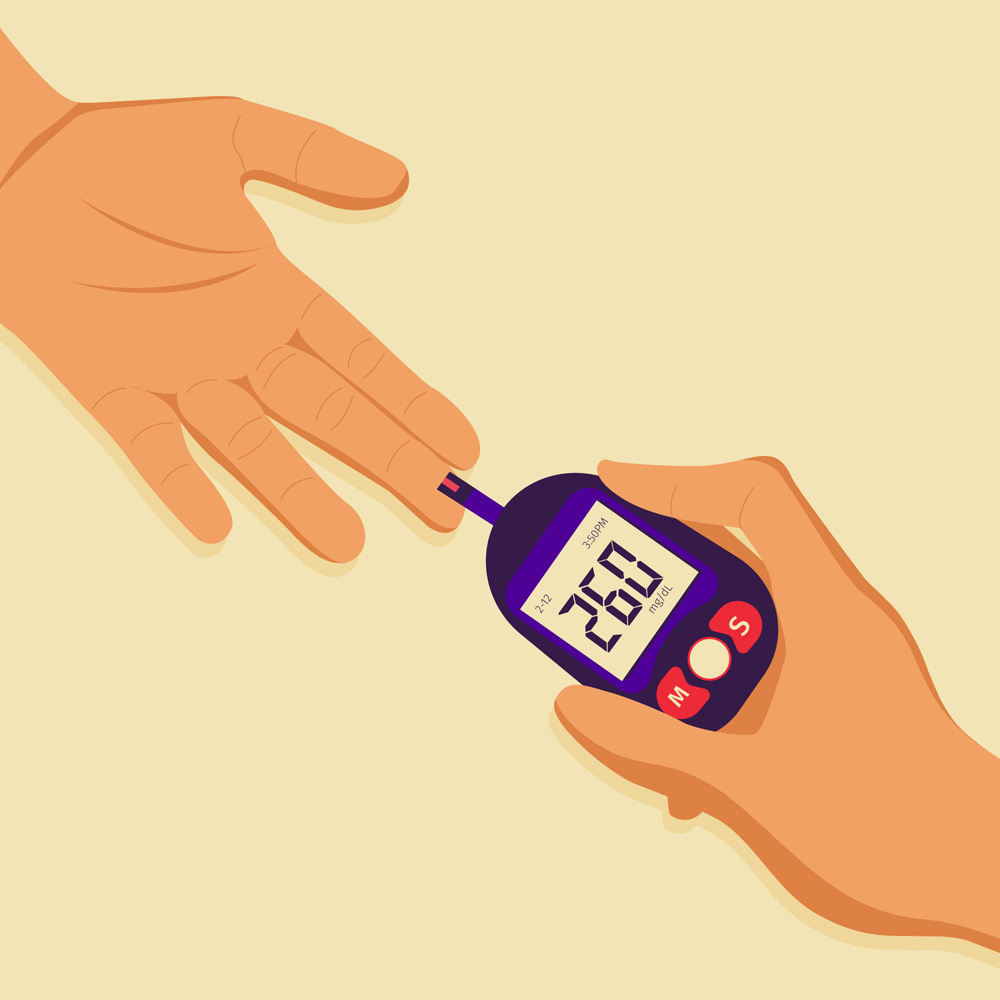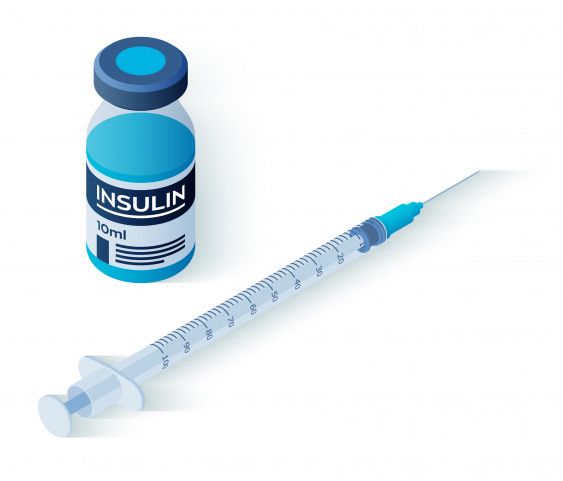Insulin
Inside the pancreas, the beta cells produce the hormone insulin. With each meal, beta cells release insulin to help the body use or store the blood sugar it gets from food
In people with type 1 diabetes, the pancreas no longer makes insulin. The beta cells have been destroyed and they need insulin shots to use glucose from meals.
People with type 2 diabetes do not always have to take insulin right away; as their beta cells are still producing insulin but its action is delayed. The longer someone has type 2 diabetes, the more likely they will require insulin.

Types of insulin
Name Of Insulin - Rapid-acting insulin
Duration
- last between 2 to 4 hours.
Type
Insulin aspart, Insulin glulisine, insulin lispro.
Name Of Insulin - Regular or short-acting insulin
Duration
- Effective for approximately 3 to 6 hours.
Type
Human Regular
Name Of Insulin - Intermediate-acting insulin
Duration
- Effective for about 12 to 18 hours
Type
NPH
Name Of Insulin - Long-acting insulin
Duration
- Tends to lower glucose levels up to 24 hours.
Type
degludec, detemir glargine
Name Of Insulin - Ultra-long-acting
Duration
- lasts about 36 hours or longe.
Type
glargine u-300
Name Of Insulin - Inhaled insulin
Duration
- Goes out of your system in 180 minutes
Type
Technosphere insulin-inhalation system
Determining your dosage:
There is no standard insulin dose as it depends on factors such as your body weight, when you eat, how often you exercise and how much insulin your body produces.
A. How Much Insulin Should You Take?
Your doctor will calculate the correct dosage for you the first time you take insulin, taking into consideration your weight, age, diet, overall health, and treatment goals
B. Where Should You Inject the Insulin?
There are four main areas to inject insulin:
- Abdomen
- Thighs
- Hips/Buttocks
- Backs of arms
A few points you should keep in mind about insulin injection sites:
- Insulin injected into the abdomen is absorbed (and therefore put to work) the most quickly.
- Using the same insulin injection site over and over is not a good idea. Eventually, insulin injected at that over-used site won’t be absorbed as quickly. You should rotate sites.
- How far in you inject the insulin also affects how quickly it’s absorbed.
C .These situations may require a change in your insulin dosage:
1. Higher doses of insulin may be needed:
- If you are sick, or have an infection
- If you reduce your level of activity
- If you gain weight
- If you are prescribed a medicine that changes your insulin sensitivity.
- If you are under continuous emotional stress
- During adolescence
- During pregnancy
2. Lower doses of insulin may be needed:
- If you become more active
- If you lose weight
- If you have problems with kidney function
Talk to you doctor and inform him about these situations so that he can change your doses if required.
3. How should you store my insulin
- Keep opened vials at room temperature.
- Throw away opened vials after one month
- Refrigerate unopened vials not in use between 36-46 degrees Fahrenheit.
- The expiration date applies to unopened, refrigerated insulin.
- For some pens and other dosing devices the storage life is less. Read the label.
- Durable pens and dosing devices should NOT be refrigerated once in use.
- Don’t expose insulin to excessive cold or heat. (Don’t store it in the freezer or in direct sunlight.)


This guide provides general information about the different medications for diabetes. But always take your medicine exactly as your doctor prescribes it. This information is just to help you know your medicines better.
FAQs on Insulin
People with type 2 diabetes do not always have to take insulin right away; that is more common in people with type 1 diabetes. As their insulin is still being produced, the longer type 2 diabetes, the more likely they will require insulin.
Just as in type 1 diabetes, insulin is a way to control your blood glucose level.
With type 2 diabetes, though, dietary changes, increasing physical activity, and some oral medications are usually enough to bring your blood glucose to a normal level.
This was a concern in the past when there was animal insulin sold as commercial insulin. There were always some amounts of impurities in the animal insulin. People's bodies reacted most of the times.
Genetic engineering has allowed large-scale production of insulin that has the same molecular structure as human insulin, so we do not need animal insulin any more.
In case you are Type 1 diabetics, your beta cells are destroyed and hence you cannot produce insulin at all. So, you will need insulin lifelong.
In case of Type 2 diabetics, it largely depends on how much damage diabetes has done to the insulin-producing cells of the pancreas. If, however, you started taking insulin when you had an infection, needed surgery, pregnancy or were hospitalized for a medical reason, your need for insulin may be temporary.
People with type 1 diabetes aren't able to make their own insulin, so they will always need to take insulin shots every day.
For people with type 2 diabetes who are on medicine, the answer isn't as clear.
- If the person also works hard to control diabetes with diet and exercise, he or she can lower the need for medicine and might be able to stop taking it altogether.
- As long as the person is able to keep blood sugar levels normal with diet and exercise, there isn't a need for medicine.
However, type 2 diabetes changes over time. This means that even if a person was able to stop taking medicine for a while, he or she might need to start taking it again in the future.
Insulin and sulfonylureas, a type of diabetes pill, can cause a person to gain some weight.
Insulin and sulfonylureas can also cause blood sugar to go too low. When that happens, a person has to eat or drink something with sugar to get the blood sugar level back up to a normal range
If you find that you're gaining weight, talk to your doctor.
Insulin cannot be taken as a pill because it would be broken down during digestion just like the protein in food. It must be injected into the fat under your skin for it to get into your blood.
